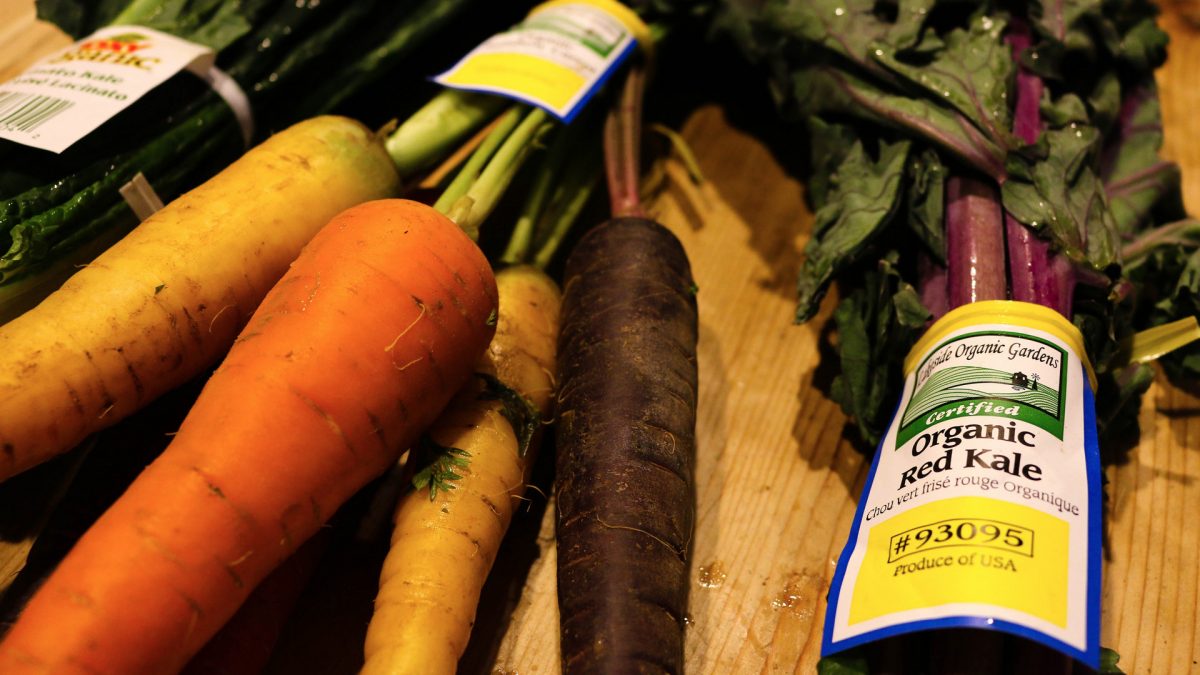Pesticides have been classified as probable carcinogens for 25 years. Different pesticides have been associated with different cancers through a variety of mechanisms, including genetic damage—direct hits to our DNA or chromosomes—and epigenetic modification, changes in the way our genes are expressed. These effects have been documented in workers who are spraying the pesticides, but exposure to pesticide residues that remain on food is much smaller.
More recently, higher cancer rates have also been noted in people who live in areas where pesticides are heavily sprayed, but what about the food we buy at the store? Organic fruits and vegetables have fewer pesticides, but even the levels on conventional produce are generally well below acceptable limits. There is still scientific controversy about the safety of some pesticides even under the regulatory limits, however, given the possible additive effects of the mixture of pesticides to which we’re exposed. The pesticide approval process also doesn’t take into account toxic breakdown products, such as dioxins, that can form once pesticides are released into the environment.
Cadmium is another issue. In the largest review to date, involving hundreds of studies, not only did organic foods have more antioxidant phytonutrients, but lower concentrations of cadmium. Cadmium is one of three highly toxic heavy metals (along with lead and mercury) found in the food supply. Cadmium accumulates in the body; so, we should try to keep intake as low as possible. Organic crops only have about half the cadmium, which is thought to come from the phosphate fertilizers that are added to conventional crops.
Of course, not all organic foods are healthy. The organic food industry is now worth tens of billions of dollars, and they didn’t get that way just selling carrots. We can now buy pesticide-free potato chips and organic jelly beans. Organic foods can be even worse because, for example, people falsely judge organic Oreo cookies to have fewer calories than conventional Oreos, and so may eat more. Forgoing exercise was deemed more acceptable when the person had just chosen an organic dessert rather than a conventional one. In fact, leniency toward forgoing exercise was slightly greater after choosing an organic dessert than after eating no dessert at all—organic cookies were effectively viewed as having negative calories! Organic junk food is still junk food.
Not only do people tend to overestimate the nutritional benefits of organic foods, they also overestimate the risks of pesticides. People think that as many people die from pesticide residues on conventional food as die in motor vehicle accidents in the United States. Surveys have found organic food buyers may think eating conventional produce is almost as bad as smoking a pack of cigarettes. That kind of thinking is dangerous because it could potentially lead to a decrease in overall fruit and vegetable consumption.
If just half of the U.S. population were to increase fruit and vegetable consumption by a single serving a day, an estimated 20,000 cancer cases might be avoided each year. That’s how powerful produce may be. But, because the model was using conventional fruits and veggies, the pesticide burden from those extra fruits and vegetables might result in 10 additional cancer cases. So overall, if half of us ate one more serving, we’d just prevent 19,990 cases of cancer a year.
Now, that was a paper written by scientists-for-hire paid for by the Alliance for Food and Farming, which is a bunch of conventional produce growers; so, they probably exaggerated the benefits and minimized the risks, but I think the bottom line is sound. We get a tremendous benefit from eating conventional fruits and vegetables that far outweighs whatever tiny bump in risk we may get from the pesticides. Why not reap the benefits without the risk and choose organic? Great! But we should never let concern about pesticides stop us from stuffing our face with as many fruits and vegetables as possible.
My video, Are the Benefits of Organic Food Underrated or Overrated?, was the final installment of a 5-part series on organics. The first four videos are:
- Are Organic Foods More Nutritious?
- Are Organic Foods Safer?
- How to Make Your Own Fruit and Vegetable Wash
- Are Organic Foods Healthier?
I’ve covered the issue of cadmium in our diet before in Cadmium and Cancer: Plant vs. Animal Foods and Male Fertility and Diet. Heavy metals are found concentrated in seafood and organ meats, but can also be found in certain supplements and protein powders.
In health,
Michael Greger, M.D.
PS: If you haven’t yet, you can subscribe to my free videos here and watch my live, year-in-review presentations:
- 2012: Uprooting the Leading Causes of Death
- 2013: More Than an Apple a Day
- 2014: From Table to Able: Combating Disabling Diseases with Food
- 2015: Food as Medicine: Preventing and Treating the Most Dreaded Diseases with Diet
- 2016: How Not To Die: The Role of Diet in Preventing, Arresting, and Reversing Our Top 15 Killers
